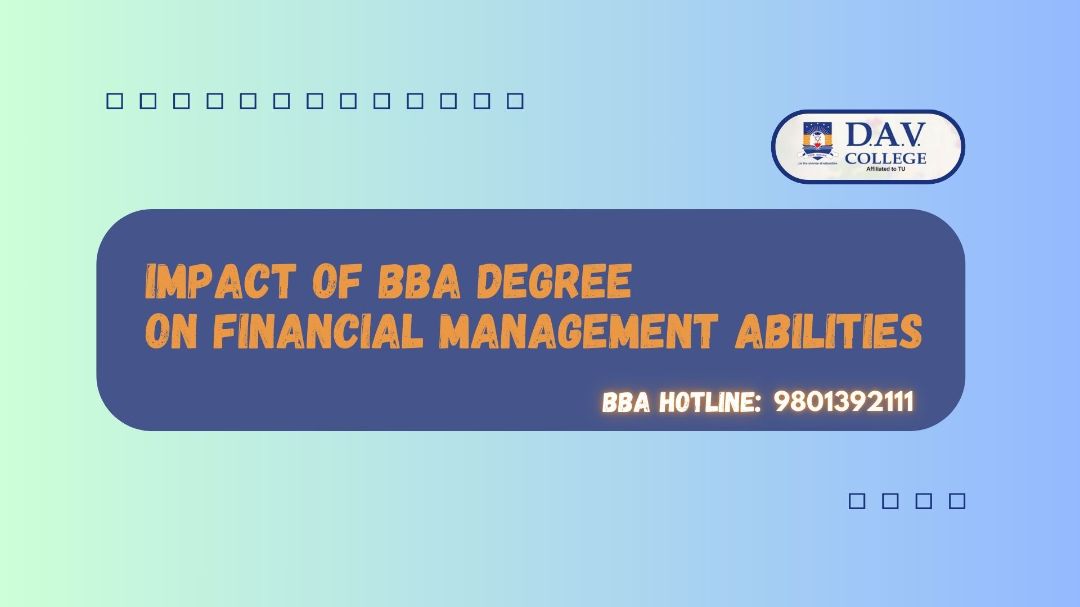How a BBA Degree Can Improve Your Financial Management Abilities
Published on 2024-07-12

Did you know that nearly half of all small businesses fail within their first five years, often due to poor financial management? In today's complex business world, understanding how to handle money effectively isn't just helpful – it's essential. That's where a Bachelor of Business Administration (BBA) degree comes in.
A Bachelor of Business Administration (BBA) degree offers valuable insights into financial management, a crucial skill for running any business.
This blog will explore how pursuing a BBA can significantly boost your financial management skills. We'll look at the key areas of financial knowledge you'll gain, from basic principles to advanced strategies, and how these can be applied in real-world situations. Whether you're aiming to run your own business or climb the corporate ladder, the financial skills you'll develop through a BBA program can set you up for success.
Understanding Financial Principles
At the heart of any BBA program are courses that cover fundamental financial concepts. You'll dive into accounting basics, learning how to read and create financial statements. These aren't just dry numbers on a page – they're the story of a business told through figures. You'll also explore budgeting techniques, and understand how to allocate resources effectively.
This financial literacy isn't just for the boardroom. The principles you learn can help you manage your personal finances too. From planning your monthly budget to understanding your investment options, these skills are invaluable in all aspects of life.
Developing Analytical Skills
A top BBA college teaching a BBA degree doesn't just teach you about finances – it shows you how to make sense of financial data. You'll learn to use various tools and techniques to analyze financial information, turning raw numbers into meaningful insights.
These analytical skills are crucial for making smart financial decisions. Whether you're assessing the profitability of a new project or deciding on a major purchase, the ability to crunch numbers and understand what they mean can make all the difference.
Learning Investment Strategies
BBA programs often include courses on investment principles and strategies. You'll learn about different types of investments, from stocks and bonds to real estate and cryptocurrencies. More importantly, you'll understand how to evaluate these options and create a balanced investment portfolio.
This knowledge isn't just for big corporations. You can apply these strategies to grow your personal wealth or help a small business make smart investment choices. Understanding the basics of investment can open up new opportunities for financial growth.
Budgeting and Forecasting
Creating and sticking to a budget is a crucial skill in financial management. In your BBA studies, you'll learn how to create comprehensive budgets for businesses of all sizes. This involves estimating income, planning expenses, and allocating resources effectively.
But a good financial manager doesn't just look at the present – they plan for the future too. That's where forecasting comes in. You'll learn techniques to predict future financial trends, helping you make informed decisions about spending, saving, and investing.
Risk Management
Every financial decision comes with some level of risk. A BBA program teaches you how to identify these risks and, more importantly, how to manage them. You'll learn about different types of financial risks, from market fluctuations to credit risks.
But identifying risks is only half the battle. You'll also explore strategies to mitigate these risks, such as diversification, insurance, and hedging. These skills can help you protect a business's financial health or safeguard your personal investments.
Ethical Financial Practices
In the world of finance, ethics matter. BBA programs emphasize the importance of ethical practices in financial management. You'll explore case studies of financial misconduct and learn about the regulations designed to prevent such behavior.
Understanding and adhering to ethical standards isn't just about following rules. It's about building trust, maintaining a good reputation, and ensuring long-term success. In an era where corporate scandals make headlines, the ability to navigate ethical dilemmas in finance is more valuable than ever.
Real-World Applications
The true value of a BBA degree lies in its practical applications. Many programs offer internships or project-based learning, allowing you to apply your financial management skills in real-world situations. You might help a local business create a budget, analyze investment options for a non-profit, or develop a financial forecast for a startup.
These experiences not only reinforce what you've learned but also give you a taste of how financial management works in practice. Many BBA graduates have gone on to successfully manage finances for small businesses, lead financial departments in large corporations, or even start their own companies, armed with the skills they gained during their studies.
Conclusion
From understanding basic financial principles to developing advanced analytical skills, a BBA degree provides a comprehensive foundation in financial management. You'll learn how to create budgets, analyze investments, manage risks, and make ethical financial decisions. Top institutions like DAV College provide you with a robust foundation of academic education and practical real-life finance and business skills. These skills are invaluable whether you're managing a multinational corporation's finances or simply trying to make the most of your personal savings.
If you're looking to improve your financial management abilities, a BBA degree could be the perfect starting point. It's not just about learning theories – it's about gaining practical, applicable skills that can shape your financial future.
Remember, in the world of business, financial know-how is power. With a BBA degree, you're not just earning a qualification – you're investing in skills that can pay dividends throughout your career and personal life. So why wait? Take the first step towards financial mastery today.
